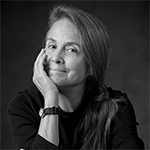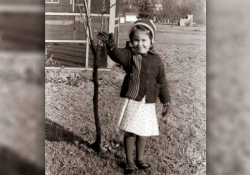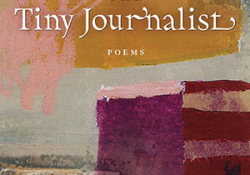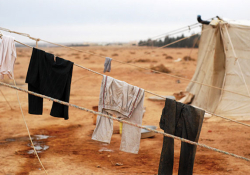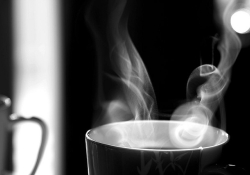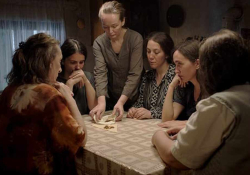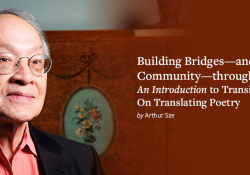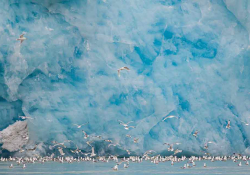There Will Be Peace in the Holy Land

In memory, Aziz Shihab
1927–2007
In the late 1950s, in the middle of the United States (we lived in Ferguson, a quiet, leafy community barely known even by people on the other side of St. Louis), my Palestinian father, Aziz Shihab, received many speaking invitations—from church groups, civic organizations, and schools. The word “holy” often figured into his presentation titles as it became known that my charismatic, thin father, who resembled a Palestinian Desi Arnaz, was able to “create a scene” in his melodious English and maintain his optimistic hopes about a better day coming soon, for all.
He talked about his simple childhood, his lack of toys, the echoing streets of Jerusalem, the friendliness of people from different backgrounds and faiths, the openness of his own Muslim family when he wanted to march, as a boy, with candle-carrying pilgrims to Bethlehem. Palestinians played bagpipes. Kids traded desserts. The world was full of mixing and mingling.
He spoke of Jesus and Mohammed, priests at the Church of the Holy Sepulchre vying for the best spots to erect their own shrines, and the fragrance of pita cooking in a fire, and yes, he was sure the people would figure it out, understand how to live together, and the Holy City would be holy again, for Palestinians, Jews, and Christians all together. He had come from a magical, spartan world full of mystical stories and twining histories, and even a waft of incense could spirit him away.
I recall people asking him how he could speak English so well. There was a British mandate, he said. I worked for the BBC starting at age fourteen.
I learned it in school.
His parents could not speak English.
He liked short sentences.
No, they had no camels. It was more a donkey kind of place.
Some people had camels, Bedouins, maybe. My grandmother remembered cowering in a ditch as a child, when Turkish soldiers came blazing through on horseback during the Turkish mandate.
Why were there so many mandates?
In retrospect, it shocks me that my father’s high hopes were so firmly entrenched despite the 1948 Balfour Declaration being so recent in memory for him. Colonization was still an aberration. Second-class citizenship could not stand. We lived in Ferguson. His family had been thrown out of their middle-class home in old downtown Jerusalem and skedaddled to a West Bank village where my grandmother had inherited a ruin of an ancient house. She would live out her 106 years there. My father’s best friend had been killed right next to him by an armed Jewish commando as the two young men sat on a bench. My own mother, whispering in the kitchen, did not ever ask him about that. How could anyone be so hopeful? Everything was in turmoil. One person’s victory, another person’s tragedy.
My father had stared at the horizon, fixated, applied for a Palestinian-students-abroad scholarship from somebody, and fled the country. I think he felt guilty about leaving. He hadn’t stayed to help fix things up.
Carrying the word “hope” with him in his pants cuffs and jacket sleeves and the slim satin pocket of his beat-up suitcase, he would actually pitch his well-described suitcase into the New York harbor upon arrival on a ship.
He would actually pitch his well-described suitcase into the New York harbor upon arrival on a ship.
Why, Daddy, why? Why would you throw your clothes away?
I was tired of them. I was starting over.
That’s really sad, Daddy!
No, it isn’t. It was—hopeful.
I thought it was terrible because he had also thrown away family photographs, family memories, which he only remembered later.
He told the religious hopefuls of greater St. Louis that things would be solved very soon if only outsiders would stop intruding in the Holy Land’s affairs.
My Palestinian grandfather, whom I never met, died when I was five. His small nest egg of money had been lost in the seizure of a bank in 1948, and he exhausted himself trying to regain stability. His heart fell apart.
My father lay facedown across the bed on top of the covers for about a week, not speaking, after work. We were worried about him.
He would be homesick for the rest of his life.
My father was the first Palestinian, also the first Arab, my mother had ever met.
He was the only Arab in Ferguson. When he ran for the school board, which in retrospect seems odd—where did he find the time to do all these extra things?—someone asked him, Who do you think you are? He smiled and quietly said his name. He won the election.
My German grandfather, Carl, took his time getting to know Aziz. He sat on our couch without speaking, staring into space. What was wrong with his daughter?
Ferguson was segregated, black and white, but there were immigrants on all sides. It was hard to figure things out. The Italians down the block, the French Canadians speaking French at home.
My father said Jews and Palestinians were more alike than different.
They should just share Palestine because after all, it was very small.
If you separate people, things will explode.
He was not a politician, he was a journalist.
He reported on happenings, told what was going on. He could describe baklava and kanafe. He asked too many questions. He said, I remember. He often said, I do not know.
Deeply wounded by exile, but even more wounded by the mistakenly righteous and wrong ideas people transmitted about what had happened in his beloved world, he always considered how many others in the world suffered their own exiles. Iranians, Armenians, our home was filled with people speaking different languages, even the rarely heard Aramaic, spoken by Dr. George Lamsa, biblical scholar and translator, one of the great elders of my early life. Exile was the scar that didn’t heal. Optimists smiled around it, though. They told their stories to keep themselves going.
Exile was the scar that didn’t heal. Optimists smiled around it, though.
When he spoke in Sunday school annexes, the hosts served small Danish butter cookies afterward, from those round blue tins. I was impressed the cookies were stacked in slim white fluted cups—so organized. I took more than one.
Sixty years pass in a flash. A flash, I tell you!
If you are young now, don’t imagine this will be any different for you. The days feel long, but it is all a flash.
And when you are older, you will feel closer to being younger than you did while in the middle.
The middle is the hard part. Childhood is the glory. Childhood is very fast but sometimes feels like forever and definitely sticks on and within you, indelibly.
I know, it sounds like a Zen koan, but it is a koan, and a beautiful blur, as well as a necklace of intricate singular images.
How anyone survives without being a poet, I do not know. Where do you store the images? It’s hard to remember what time it is, even what season.
How anyone survives without being a poet, I do not know.
Sixty more years, and peace has not come. Palestine, Israel, Pal-Is, Is-Pal, it should be easier than it is. Jerusalem is the capital of itself. Its heart still belongs to everybody who turns to it. Its heart cannot be manipulated by men in suits, with bank accounts. Call it something else, but Jerusalem knows.
We are living through a pandemic, in the whole world, for months that feel like years. The pandemic belongs to nobody and nobody wants to claim it. The pandemic has no leader.
People write to me, Did you hear that Israelis are receiving vaccines, but Palestinians are not receiving any?
Did you hear about the Palestinian babies left in cribs in the rubble, after the houses were bombed?
Did you hear, do you know, what can be done, have you read that great book by Yousef Bashir—The Words of My Father . . .
My father has been dead for thirteen years. I still speak with him daily. Some of his ashes, which I spirited away from the main box of ashes, were buried at the base of a fig tree he planted in our yard.
Before he died, he said, I really wish that Barack Obama would have a chance, but I don’t think he does.
He could never have imagined Donald Trump ascending to the presidency. Such a fact would have horrified him.
But the worst? The very worst?
Jared Kushner dabbling in the Middle East for his own personal, pocketed gain.
Oh!
Jared Kushner wheeling and dealing. Bearing a pretense that he has any right to. Jared of the smooth face and implacable gaze. I’m sure he loves his own children, but has he ever once imagined the beauty of Palestinian children? Jared? Jared making pronouncements.
I can’t even imagine what Aziz would have thought about Jared.
He might have started speaking in tongues.
The hope had to come from inside. The hope had to be borne of all the people who wanted to live there, who did live there, who had lived there, recognizing shared dreams and destinies in that very small place laden with so many sacred stories.
Seeds of Peace. Neve Shalom. Wahat al-Salam. Hand in Hand Schools. Mahmoud Darwish. Yehuda Amichai. The Parents Circle-Families Forum. Groups or schools or villages composed of both peoples, stitched with mutual respect, the real people getting together, saying “enough of this foolishness, enough apartheid, thank you, we can see farther than that.” The chefs Ottolenghi and Tamimi. Dr. Edward Said and Daniel Barenboim. Mixing it up. Cooking the food. Playing the music. Crossing the lines.
Not Jared Kushner.
On Christmas Day 2020, the great writer Barry Lopez died. Back in 1986, in a Canadian interview, Barry said, “Eskimos do not think that one person has all the wisdom. There is not an apex with one guy sitting at the top and telling the others what to do.”
Unless you are Jared Kushner.
There are Palestinian children in West Bank villages writing graphic novels today about dreams, and trees, and plants you can use as medicine, and hopes that the virus will be gone soon so they can go eat with their cousins again, and school friends, and funny mysteries about sisters who close their eyes and disappear to other galaxies, and bugs. They are not complaining. But they deserve better lives. They are not second-class citizens. They look adorable like kids you could use in clothing ads. They are perfect. I love Google Chat and Zoom and FaceTime and Skype for connecting us. Their parents and uncles are frequently jailed without cause. They have to step carefully at all times. Someone is training a gun on them from a lookout post. This is not a fiction. They don’t mention it, but I know. I have lived there. I have traveled there. My relatives lived there. Their ancestors have lost orchards, plots of land, houses, roads, rights. But they have not lost dignity.
A smiling boy tells me that spiders are afraid of ants. Really?
Sometimes a spider will impersonate an ant so it won’t be attacked.
How does a spider impersonate an ant?
He smiles widely.
It’s mostly a facial expression.
Right before my father died, the Presbyterian hospital chaplain, a gentle man, asked him if he believed there could ever be peace in the Holy Land.
I will always feel thankful to that man. He invited the last lecture.
For one moment my father could forget his failing body, his face contorted in pain, and recall his lifetime conviction.
Aziz mustered up his last skinny scraps of voice to say, Of course! No one wants to live in conflict forever! Who awakens any morning to declare, I hope there will be fighting around my house today? No one! They will figure it out! Leave them alone!
Thunder rumbled outside.
The chaplain held my father’s left hand with both his hands and prayed for him.
My father’s facial expression softened.
He always accepted any prayers, from anybody. Hare Krishna on the corner. Dervish in a restaurant.
Thank you.
Outside the grimy hospital window, birds were lighting on the wires that people were probably speaking through. I don’t know, do people still speak through wires? Do our wingless voices just fly now, disembodied but identifiable, through miraculous systems and psychic switchboards, finding cell phones and listeners wherever they go?
There will be peace, because there has always been peace. In people’s pillows, at tables, in children’s eyes, in stones, in dry earth around poppies.
There will be peace, because there has always been peace.
In pumpkin seeds. In teachers. At gravesites. The grave of my grandmother noted by an unmarked white stone. In the places where people kneel, crouch, press up against a wall, tuck a note into a crack, light a thin taper. In school desks and blank notebooks and blackened falafel skillets. The scent of dampness held in a windowsill. The small pouches hand-stitched with yellow petals. The mess. You can make all the chaos you want, and pretend the wall is keeping you safe, you may be cruel or pious, you may not carry a weapon into any heaven ever described by any religion, but know that peace is patiently hovering inside of everything and will not belong to anyone and never has, and someday someone wiser will welcome it again. And what a day that will be.
San Antonio, Texas

